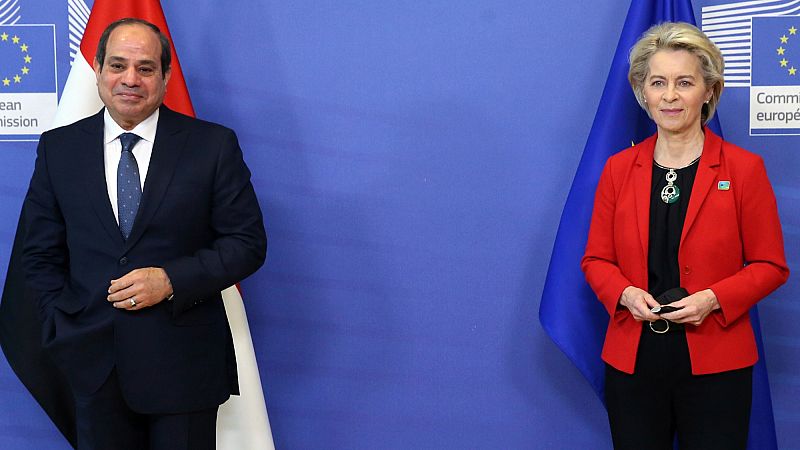Exclusive: EU to announce €75 million package in financial support for Egypt

The European Commission is set to sign a €75 million package in support to Egypt in a high-level summit with the European Union that will take place on Wednesday in Brussels, an EU official told Euronews.
The grant aims to promote socio-economic development, strengthen resilience, and foster inclusive growth by improving access to health, education, water and sanitation, especially for women and youth, the official informed.
Egypt played a vital role in facilitating a ceasefire agreement in Gaza. It also hosted an international conference earlier this month, attended by US President Donald Trump and European and Arab leaders, to implement the first phase of the Gaza peace plan.
The funding is part of a macro-financial framework adopted in March 2024, which foresees a total investment of €7.4 billion in Egypt over 2024-2027.
"Today’s first EU–Egypt high-level event and summit mark a new phase of our strategic and comprehensive partnership, further strengthening cooperation on economic resilience, sustainable development, and reforms," European Commissioner for the Mediterranean Dubravka Šuica said in a statement.
During the meeting the EU will be represented by European Commission President Ursula von der Leyen and European Council President António Costa. Egyptian President Abdel Fattah el-Sisi will attend the meeting.
Besides the €75 million in grants, the Commission will also announce additional loans during the event, the EU official said, under the €7.4 billion framework.
Euronews contacted the Egyptian mission to the EU for further details, but did not receive a reply at the time of publication.
Not the first time
Since March 2024, the European Union has stepped up its cooperation with Egypt, which it regards as a strategic partner across six key areas: political relations, economic stability, trade and investment, migration and mobility, security and demography, and human capital.
As part of this renewed partnership, the EU unveiled a €7.4 billion support package for 2024–2027.
The disbursement of instalments does not occur automatically, since each requires the adoption of a distinct EU legislative act. As a result, the process may be influenced by political divisions or disagreements, potentially leading to its suspension.
In April of the same year, the EU approved and disbursed a €1 billion short-term microfinance assistance loan to help Egypt tackle urgent economic stability challenges as part of the €7.4 billion package.
Earlier this year, EU countries and the European Parliament agreed to add further €4 billion under the same framework, which has not yet been disbursed.
A two-decade relationship
The EU has regular relations with Egypt through the so-called "association council," convened for the first time in 2004.
The association is a joint political body, usually convened whenever there is political will, that manages the EU’s bilateral relations with a non-EU country, oversees their agreements, and guides political and economic cooperation.
In addition to the association council, the EU and Egypt decided to convene a high-level meeting every two years, as a sign of the intensification of bilateral relations, with Wednesday's meeting the first of its kind.
"The EU deeply values Egypt’s stabilising role in the Middle East region and its mediation role in the Gaza conflict. Our first bilateral summit will be an excellent opportunity to further deepen our partnership, cooperate in addressing our common challenges and unleash the full potential of our relationship," Costa said in a press release ahead of the event.
The most recent Association Council with Egypt was held in January 2024, during which the two sides did not officially adopt any new decisions. However, they issued a political declaration reaffirming their commitment to strengthening cooperation and shared objectives, marking the 20th anniversary of their association agreement.
A 'strategic' partner
In 2024, the EU remained Egypt’s largest trading partner, representing 22% of its total trade. It was the top destination for Egyptian exports (26.5%) and the primary source of its imports (19.9%).
Egypt is also a key country in migration management. Although it is not a significant point of origin of irregular migration, 9% of migrants who irregularly reached the EU territory are Egyptian nationals, according to 2024 data from the UN agency for migration, IOM.
In a letter to EU heads of state ahead of the European Council on Thursday, European Commission President Ursula von der Leyen promised to adopt an additional €675 million for migration management in Egypt, Tunisia, Libya, Morocco and Algeria to prevent departures for the period 2025-2027.
According to the United Nations Population Fund (UNFPA), Egypt’s population in 2025 is estimated at some 116.3 million, with a median age of around 24.5 years.
Young people tend to leave Egypt due to the deep economic crisis the North African country is experiencing, and the firm control of the society under el-Sisi.
The EU aims to create the conditions for young people to remain in Egypt by investing in the country. However, experts noted that the current government is partly the reason for the Egyptian economy's stagnation.
Anthony Dworkin of the European Council on Foreign Relations (ECFR) said one of the issues Egypt faces is "the heavy dominance of the army and regime-linked firms in the country’s economy, which crowds out private sector investment.”
"Egypt's government has promised reforms to level the economic playing field, but progress has been slow. European leaders should emphasise that deepening cooperation depends on Egypt following through on its promises," Dworkin added.
Today

